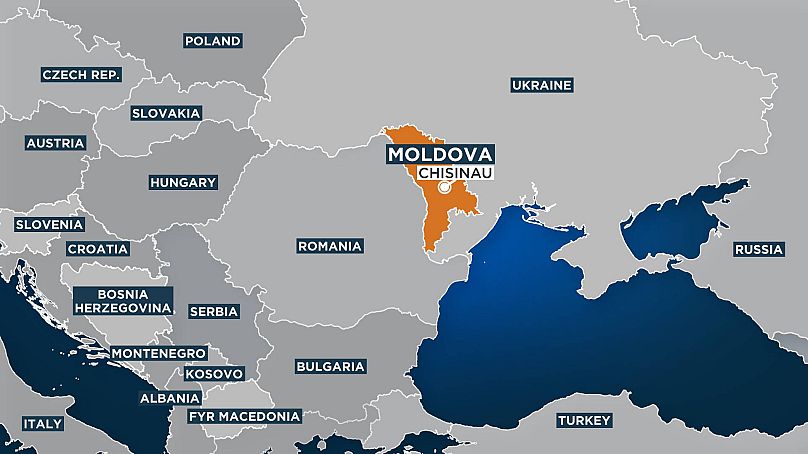Euronews explains what protesters have hit the streets about in Moldova.
What happened?
 ADVERTISEMENT
ADVERTISEMENT
Riot police in the Moldova capital Chisinau have clashed with anti-government protesters upset over alleged corruption and a disputed election.
Campaigners claim officers in uniform and plain clothes used “brutal force” to pull protesters away from what they said was a “peaceful, all-night sit-in”.
It happened early on Monday, August 27, as the country’s leaders were set to mark the country’s independence day.
The clashes came after a much bigger protest the day before, which saw thousands rally in Chisinau against the government.
What triggered the protests?
The trigger was a court ruling that invalidated the election of a pro-European candidate in the Chisinau mayoral race.
Andrei Nastase, leader of the populist Dignity and Truth Platform Party, unexpectedly beat a pro-Russian candidate in the June election.
But the result was scrapped by the courts because Nastase ran a Facebook live broadcast on election day urging people to vote.
The move was criticised by the EU, Canada and the US, who called it a threat to Moldovan democracy.
What else are protesters upset at?
They are concerned at the power wielded by the billionaire businessman Vladimir Plahotniuc, who is the leader of the ruling Democratic Party of Moldova (DPM).
Dionis Cenusa, an expert on Moldova from the University of Giessen in Germany, told Euronews critics consider Plahotniuc — who is said to own 70% of Moldova’s media — as having captured the state.
His party, DPM, came fourth in Moldova’s general election four years ago with 15.8% of the vote but has still ended up in power.
DPM, historically considered pro-EU, joined with liberal democrats and former communists to form a parliamentary majority.
Alexandru Damian, from the Romanian Center for European Policies, claimed DPM’s links with pro-Russian MPs was setting alarm bells ringing in the west.
He said the establishment of Nastase’s pro-EU party was threatening the narrative that the current Moldovan government was Brussels-friendly.
What about Moldova’s relationship with Europe?
Moldova signed an agreement four years ago that will see Brussels help fund reforms that will make the country more EU-friendly.
But the European Commission said in July it was freezing a €100 million aid package over the dispute mayoral election.
MEPs also criticised the election outcome.
“For the first time anti-EU rhetoric, which is generally associated with the socialist party, has been adopted by the Democratic Party of Moldova and their media outlets in responding to the European Parliament vote,” wrote Damian.
What’s next?
Parliamentary elections are due in the coming months, which could see Moldova move further away from Europe.
Experts say electoral reforms put in place recently will make it harder for newly-established parties like Nastase’s
“For the EU, the invalidation of the elections might have set alarm bells ringing, but this could be too little, too late,” said Damian.
“The autumn elections, if organised on the new mixed electoral formula — a combination of single-seat majority constituencies and proportional party lists — favours the pro-Russian socialists, who may be able to win the contest.”
Cenusa, meanwhile, warned other former Soviet countries could mimic how Moldova is handling the EU.
“These are not the first protests organised by the anti-oligarchic opposition of Moldova and they are not that worrisome to Europe as those in Romania, because the latter is part of NATO and EU,” he said.
“However the case of Moldova is dangerous for other former Soviet countries that have agreements with the EU.
“This is because the oligarchic regimes in the region successfully learn from each other, including in term how to mimic reforms and how to overcome EU's conditionality principle.”
What does Moldova’s government say?
The Moldovan government did not immediately respond to Euronews' request for comment.
The government has, however, received support from Hungary.
The country’s foreign minister, Peter Szijjarto, said on Tuesday the EU should unfreeze the €100 million aid package for Moldova.











